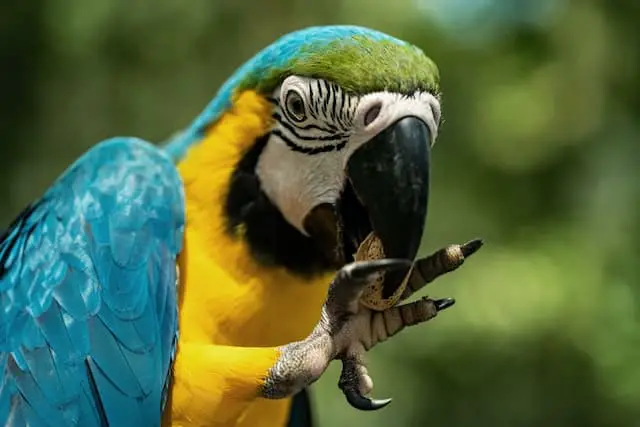Depression can hit people very strongly, and sometimes people will seek treatment, others will remain struggling with this problem until they find out they are about to commit suicide, and perhaps at that time they will seek the treatment if they survived any suicide attempt.
But, do parrots get depressed?
The answer is yes, parrots can get depressed if they were under certain circumstances. These feathery creatures actually prone to develop a mental disorder such as depression or anxiety, leading them to many behavioral problems, like feather plucking, aggression, and low appetite.
These behavioral problems could stay with the parrot for long a time, leading him to be a plucker (parrot who plucks his feathers out of boredom). So, it’s really important to prevent your parrot from developing depression or anxiety disorder.
In this article, we will dive into everything you need to know regarding depressed a parrot, what may cause depression, how to tell if your parrot is having depressive times, and how to help him. Let’s get into this:

Why Do Parrots Get Depressed?
To know why parrots get depressed, let’s think about why people get depressed. I will not talk about all reasons, but there is 1 reason that can tell us why parrots get depressed.
However, for a human being socially inactive can lead sometimes to depression, but not in all cases. A human can develop strategies and activities to stimulate the brain as it would in social interaction, social media, and video games, for example.
And parrots can’t do the same thing, they only got 2 choices, either they engage socially, or they will stay lonely, they can’t stimulate their brains as a person would.
And this is exactly why parrots get depressed. Unfortunately, some owners do not realize this when they raise a parrot. They would think food is all that parrots need as pets.
Raising a cat or a dog in most cases would be with no cage to put them inside, but for parrots, the cage is essential in most cases. Cats and dogs can entertain themselves with many activities. They may play around the house, look for food, and chase each other. But parrots may not get this chance.
So, imagine a parrot living in a cage without a cage mate, and with the owner not paying attention to him, what do you think would happen to the parrot? Of course, it will get depressed.
Apart from that, there is a possibility that the parrot is sad and depressed because of sickness, a sick parrot may feel depressed or stressed, a molting parrot can get depressed as well.
Molting is not a big problem, since all parrots shed their old feathers once or twice a year. All you can do is to give you bird meals rich in vitamins and minerals.
But if the parrot is sick or wounded, then you have to do further steps, and that includes a visit to the vet.
The insufficient diet also can cause your parrot to feel stressed, so make sure your parrot is eating what he needs.
How to Tell if Your Parrot is Depressed?
A depressed parrot can show some symptoms like aggression, low appetite, fluffed feathers, and feather plucking. Besides that, you need to know if they’re something new happened to your parrot’s environment as it’s going to help you know if your parrot is depressed, at least as a beginner.
Like did you change your parrot’s cage, toys, food, etc? did your parrot lose his cage mate, or do you give your bird enough attention? You need to realize that most parrots need a daily interaction of 1 or 2 hours.
Any lack in the social requirements for parrot can cause depression.
Knowing the exact conditions around your parrot can help you determine if the bird is depressed. But in most cases, parrots will start plucking their feathers, start making unusual screams and vocalization, and they may cry, yes parrots can cry. Here is how to know if your parrot is crying.
Also, aggression and sensitivity are obvious indicators that the parrot is depressed. The bird may act aggressively whenever you try to reach him. He may hate when you touch him, he will be so sensitive. However, you need to know if the aggression is normal with the bird or not, aggression for some parrots like Quakers is mostly normal.
How to Make Your Depressed Parrot Happy?
Luckily, to help a depressed parrot, you won’t need to go to the vet or start a psychological therapy treatment or any of that.
All you need to do after knowing what was the reason behind the depression (loneliness is the reason in most cases) is t do the opposite thing. So, if your parrot is lonely, then bring a new cage mate or give him more playtime. If your parrot’s diet is insufficient, then make sure you feed him very well.
If you changed the cage, or your bird lost his cage mate or anything that you can’t help with it, then you can start giving your parrot more fun time, and parrots enjoy the social interaction the most, so start increasing the time you spend with your parrot, and eventually he will forget.
Further Reading:
Do Parrots Love Their Owners?
Conclusion
In conclusion, most parrots are prone to depression and anxiety, they will feel depressed mostly from loneliness, other things may not cause them this disorder unless it was so severe, like highly insufficient diet, or suffering from the sickness for a long time without any provided care.
However, if you noticed your parrot is depressed, you need to act immediately to help him, to prevent his condition from getting worse, and leading to many behavioral problems, eventually.
However, if your parrot developed a behavioral disorder, then there is a possibility that this behavior will stick with your bird even if he isn’t depressed, especially the feather plucking problem.
So, be careful…..

Hello, my name is sadeq and I am obsessed about parrot And I am here to share everything about raising pet parrots and how to be good owners to your bird.







